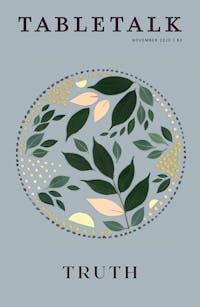
Request your free, three-month trial to Tabletalk magazine. You’ll receive the print issue monthly and gain immediate digital access to decades of archives. This trial is risk-free. No credit card required.
Try Tabletalk NowAlready receive Tabletalk magazine every month?
Verify your email address to gain unlimited access.
In high school, a group of friends of mine decided to go camping on top of Lookout Mountain, Ga. These friends, about ten of them, included a mixed group of guys and girls. I knew my parents wouldn’t allow me to go camping in such a mixed company, so I “neglected” to tell them about the presence of the female companions. We had a great time—no foul play—but when I returned home, my parents confronted me, and when I tried to wiggle my way out of it by distorting the truth further, they grounded me. Rightfully so.
Little “white lies” like this seem rather harmless, but how often do we skirt the truth, hide the truth, or neglect to tell the truth? The reality is that God loves the truth, delights in the truth, and upholds the truth because He is the God of truth. As the sovereign Creator of all things, He established truth and has revealed His truth generally in creation and specifically in His Word (Ps. 19).
The Apostle John writes, “God is light, and in him is no darkness at all” (1 John 1:5). This “light” of God conveys the moral qualities of truth, integrity, and righteousness. Not only is God the true and living God—as opposed to all the false gods of this world—He also knows all things as they truly are. In other words, He is not misguided or confused but rather has an accurate and complete knowledge of all things.
This God of truth calls us to love the truth, delight in the truth, speak the truth, and walk in the truth. If the church is to be “a pillar and buttress of truth” (1 Tim. 3:15), we need to know the truth and cultivate the moral fortitude of upholding the truth in a world of lies.
Our first parents were tempted through the lie of Satan, the “father of lies” (John 8:44). It is no wonder that God would establish His concern for truth in His Word. In his well-known hymn “A Mighty Fortress Is Our God,” Martin Luther wrote:
Let goods and kindred go,
This mortal life also;
The body they may kill:
God’s truth abideth still,
His kingdom is forever.
While Satan attempts to destroy God’s truth and the world seeks to undermine it, the wrath of our sovereign and holy God has been revealed against the unrighteousness of men, “who by their unrighteousness suppress the truth” and have “exchanged the truth about God for a lie” (Rom. 1:18, 25). But God’s truth will abide; His kingdom is forever.
The Ninth Commandment
The Ten Commandments convey how we are to love God (1–4) and neighbor (5–10). Along with the manna and Aaron’s staff, the Ten Commandments were placed inside the ark of the covenant—revealing their significance to the life and identity of Israel—and they also became the foundation of all the other laws and commands of God. They provide a portrait of the life that is pleasing to Him.
God gave the Ten Commandments in context of the covenant He made with His people at Sinai. God had acted on behalf of Israel, assuring them of their status as His people: “I am the LORD your God who brought you out of the land of Egypt, out of the house of slavery” (Ex. 20:2; see Deut. 5:6). God’s deliverance and redemption, therefore, became the backdrop to God’s decree and law. They were His people, and He was their God.
The ninth commandment instructs us about the importance of truth: “You shall not bear false witness against your neighbor” (Ex. 20:16). The legal trial forms the background of this commandment in which a false witness could lead to severe punishment for one’s neighbor. Witnesses were very important in the ancient world. Deuteronomy 17:6 states, “On the evidence of two witnesses or three witnesses the one who is to die shall be put to death; a person shall not be put to death on the evidence of one witness.” A false witness, therefore, had the potential of causing great injustice to an innocent party. But the ninth commandment conveys much more than this specific application.
Duties Required and Sins Forbidden
The Westminster Larger Catechism devotes three questions to the ninth commandment (143–45), providing the content of the commandment as well as the “duties required” (the positive) and “sins forbidden” (the negative) by it.
Positively, the Westminster divines taught that we are to preserve and promote truth between man and man, and the good name of our neighbor, as well as our own. We are to appear and stand for the truth, to speak the truth, and to study and practice whatsoever things are true, honest, lovely, and of good report (Phil. 4:8). Negatively, the Westminster divines taught that we should not succumb to prejudicing the truth or the good name of our neighbor, or our own. We should not give false evidence, pass unjust sentence, conceal the truth, remain silent when the truth should be spoken, or speak the truth unseasonably, maliciously, or in a way that perverts it to a wrong meaning. Moreover, we are not to give in to lying, slandering, backbiting, scoffing, reviling, raising false rumors, and other sins of falsehood. Thus, we are to have a charitable esteem of our neighbors, assuming the best about them unless there is clear evidence to the contrary, not paying heed to gossip.
While the text of the ninth commandment specifically says only that we are not to bear false witness, it conveys the overall importance that God places on truth, as seen in the Westminster Assembly’s application of it. The argument is one of the greater to lesser: If bearing false witness against our neighbor is forbidden—which could lead to his death (the greater)—then certainly all other forms of falsehood are likewise forbidden (the lesser).

In his commentary on the Larger Catechism, Johannes Vos explains, “The general scope of the ninth commandment is the sanctity of truth and honesty in human society, and the duty of maintaining our own and our neighbor’s good name.” Because truth is an attribute of God, and because we are created in His image, we are to support, defend, and uphold the truth in our lives, our homes, our churches, and our society.
Three Ways to Live Out the Truth
In light of the fact that God is a God of truth and has concern for the truth—seen particularly in the ninth commandment—what are some practical ways we can live out that truth in our daily lives? Let me give you three.
First, diligently keep watch over the sins of the tongue. As James says, “The tongue is a fire, a world of unrighteousness” (3:6). The image goes on, conveying how quickly a fire can spread. We should heed the warnings of Scripture: “A false witness will not go unpunished, and he who breathes out lies will perish” (Prov. 19:9). By nature we have prejudice against the truth and should be watchful for ways that we continue to distort the truth. False speech—the sins of gossip, slander, lying, bearing false witness, etc.—should have no place on our lips, for these not only grieve the heart of the God of truth, but they can easily spread and cause great harm to our neighbors. Rather, we are to speak “truth in love” (Eph. 4:15) and promote the good name of our neighbor.
Second, because God is both sovereign and the source of all truth, we can trust Him and His Word. He is reliable and His promises cannot fail. The inerrancy, infallibility, and truthfulness of His Word provide a solid foundation upon which to build a coherent and consistent worldview—one that gives hope and elicits trust while living in an unstable world. Jesus prayed for His disciples, “Sanctify them in the truth; your word is truth” (John 17:17). The Apostle Paul reminded the Ephesians of their sealing by the Holy Spirit when they heard and believed “the word of truth” (Eph. 1:13). We are called to put our trust in the true and living God, “who never lies” (Titus 1:2). The reality that our sovereign God is the source of all truth gives rest to weary and wandering souls.
Third, study and know the truth, “which will set you free” (John 8:32). Truth is embodied in the person of Jesus Christ, who is “the way, and the truth, and the life” (14:6). He is called the “true light” (1:9), the “true bread” (6:32), and the “true vine” (15:1). As the embodiment of truth, Christ bled and died so that we could be forgiven for all our false testimony and sins of the tongue. We should cultivate a deeper knowledge of Jesus and His truth—meditating on that truth day and night, hiding it in our hearts that we might not sin against Him, and availing ourselves of it through the regular preaching of God’s Word. “Let the word of Christ dwell in you richly” (Col. 3:16).
Jesus came into the world “to bear witness to the truth” (John 18:37), and the world rejected Him and scoffed at Him. But His sheep know the voice of their Good Shepherd, and they follow Him. He gives them eternal life, and no one will snatch them from His hand. We, too, bear witness to the truth in a world that desperately needs the Savior, a world that needs the voice of the Shepherd who leads them to the green pastures of His transformative grace. May we love, speak, and walk in God’s truth—that we may glorify God and enjoy Him forever.
